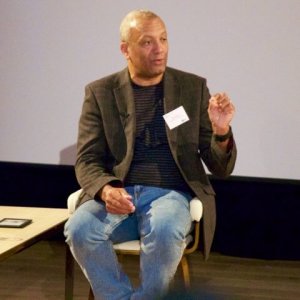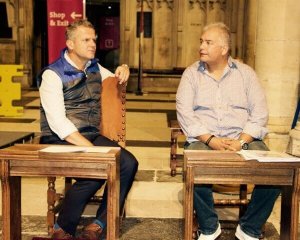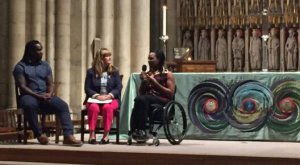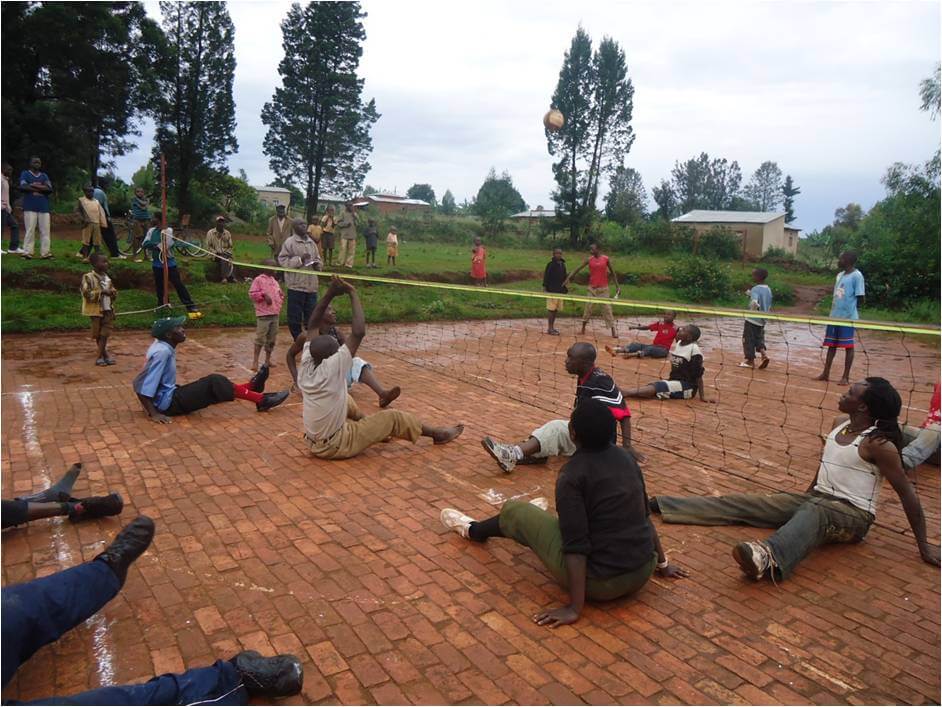With the Paralympics starting in Rio de Janeiro today, the Anglican Alliance is reaffirming the significance of faith in sport, and celebrating the inclusion of disability in the Sustainable Development Goals (SDGs).
Paralympian Anne Wafula-Strike was born into a Christian family in Mihuu, Kenya. She contracted polio at the age of two. The condition rendered her legs paralysed and she began using crutches as a teenager, eventually moving into a wheelchair as an adult.
Speaking recently at the Inaugural Global Congress on Sport and Christianity, held at York St John University, Anne said:
“My mother and father were both Christians so I knew about the Christian faith from an early age. I was baptised in the Anglican Church of Kenya and we worshipped every Sunday without fail. My faith grew at school, where they taught us the Bible and Christian values. But I was still young, and the things I was being taught were hard to understand. It was not easy being a Christian with a disability in Africa. There are so many challenges. I did not like going to church each Sunday; people looked at me as if I was the biggest sinner and needed the most grace because I am disabled.”
During the Congress Professor John Swinton, a priest with the Church of Scotland, reminded participants of the many ways that society subtly re-disables people. He said, “In their language as well as in their actions, to describe people as overcoming, or being courageous, or as super-human, re-affirms their disability rather than their ability.”
 Professor Swinton, pictured left, asked us to remember that “all are created in the image of God and living with a disability should not alter this.” He concluded with a call for Christians to “use the Paralympics as a movement to transform the lives of disabled people across the world”.
Professor Swinton, pictured left, asked us to remember that “all are created in the image of God and living with a disability should not alter this.” He concluded with a call for Christians to “use the Paralympics as a movement to transform the lives of disabled people across the world”.
In support of this, the Anglican Alliance is calling for more recognition of the issues surrounding disability and development. Whilst the inclusion of people with disabilities in the SDGs is something to celebrate, more needs to be done to challenge the existing narrative and see the goals outlined in the SDG framework become reality.
In particular, the Anglican Alliance is highlighting the following goals:
- Ensure inclusive and equitable quality education and promote lifelong learning opportunities for all: “Build and upgrade education facilities that are child, disability and gender sensitive and provide safe, non-violent, inclusive and effective learning environments for all.”
- Reduce inequality within and among countries: “By 2030, empower and promote the social, economic and political inclusion of all, irrespective of age, sex, disability, race, ethnicity, origin, religion or economic or other status.”
- Strengthen the means of implementation and revitalise the global partnership for sustainable development: “By 2020, enhance capacity-building support to developing countries.”
We are also encouraging national churches to engage locally on the implementation of the SDGs to ensure that inclusion is prioritised at a national level.

In his presentation at the Congress, Rev Andy Bowerman, Co-Executive Director at the Anglican Alliance, pictured right, said: “It will take more than simple inspiration: we need to turn that inspiration that we see on our screens into practical action and commitment to lift up the voices of the many millions of people who do not flourish as they should because of their disability.”
In her keynote address, Anne Wafula-Strike went on to say, “At some churches, they told me I needed healing. As I grew in my faith, I saw it was my responsibility and God was going to help me to teach them that God could still use me as a vessel just the way I was with a disability. That was very challenging because it is very difficult to tell a pastor, “I think God loves me the way I am”.”
As the Congress drew to a conclusion, the 180 participants gathered in York Minster for a service to celebrate the joy and wonder that sport brings, and recommit themselves to using sport to enable all people to flourish.
The Bishop of Leeds, Rt Rev Nick Baines spoke on the links between sport and faith: the need for discipline, for community and for perseverance towards a higher goal. He concluded by reminding us that perhaps the most powerful metaphor is that sports women and men are driven by hope and not fear, as Christians also should be.

Anne Wafula-Strike, pictured left, concluded her address by quoting from her autobiography, ‘In my dreams I can dance’, saying: “Sometimes I felt angry with God, especially when I was growing up and I was a teenager. When my friends were wearing high heels and short skirts and were dancing, that was what I wanted to do. I grew older and realised that God has got a purpose in my life and instead of just being angry with God, I am learning to be thankful and grateful to God every single day when I wake up and in so doing I am learning to dance with him.”
God moves in mysterious ways … a reflection from Annamaney Arumanayagam, Anglican Alliance Facilitator for East Asia
The nation of Malaysia waited expectantly for our Badminton hero, Lee Chong Wei, to bring home the first ever Olympic gold from Rio. He was our best and last chance at the Rio Olympics 2016. The nation waited with bated breath as he battled the men’s badminton singles. Sadly, his valiant attempt only got him the silver.
Then, in an unheralded and unexpected turn of events, a couple of weeks later, on 10 Sept 2016, also in Rio, the first gold for Malaysia on that level was won by Mohamad Ridzuan Mohamad Puzi in the 100m sprint at the Rio Paralympics. A few hours later, Muhammad Ziyad Zolkefli shattered the world record for men’s shot put to win Malaysia’s second gold. A few days later, Abdul Latif Romly won the third gold for Malaysia at the men’s long jump, breaking multiple records in the process. For the icing on the cake, Siti Noor Radiah Ismail won bronze in the women’s long jump, bringing Malaysia’s medal tally to three golds and one bronze.
The Nation rejoiced.
For those with some form of disability, what happened last week provided the opportunity to highlight their contribution to the community and nation. It brought recognition of their abilities rather than disabilities. It also highlighted the lack of opportunities for so many people living with disabilities.
I see God’s hand in this, bringing the long awaited gold to our nation, not through the able-bodied, but through those whom the world sees and values as “lesser able”.
Notes
- Anne Wafula-Strike was a 2004 Paralympics in Athens for her home country of Kenya. She participated as a torchbearer for the 2012 Games in London. She continues to train and inspire other Paralympic hopefuls. She is committed to raising the issues that surround disability in Africa & across the globe through her own trust and through working with others.
- The SDGs were launched in September 2015 and form one of the most comprehensive international development frameworks ever written. More can be seen at https://sustainabledevelopment.un.org/?menu=1300
In the picture: A sitting volleyball match in Muyinga town, Burundi, organised by the Bethesda project, an inclusive sport and disability outreach organisation of the Anglican Church in Burundi.

